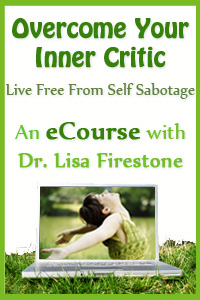 Where your critical inner voice comes from
Where your critical inner voice comes from
As small children, we are helpless and entirely dependent on adults for nurturance and to have our needs met. It is impossible for even the most loving parent to anticipate and respond to all of the needs of an infant, therefore every child suffers from some degree of frustration, deprivation and pain. At these times, children defend against the intense emotions that they are experiencing as unbearable by cutting off from their feelings. Unfortunately, they are reluctant to be vulnerable to feeling again for fear of re-experiencing the agonizing emotions that they originally defended themselves against.
As we grow up, we maintain the defensive adaptation that was appropriate to our early childhoods. It develops into a defense system that keeps us self-protective and guarded against feeling. We live as though we are still helpless children and that we will still be traumatized by events that we can easily tolerate as adults.
Watch a Whiteboard Video on The Critical Inner Voice
The critical inner voice
Within each of us is an internal dialogue that supports our defense system. The critical inner voice is this dialogue, and it is the language of the defense system. It encourages us to cut off our feelings, to not be vulnerable, to not let others close. It separates us from people by promoting cynical attitudes toward others and self-hating attitudes toward ourselves. It criticizes and degrades us, and reminds us that we are unlovable.
The critical inner voice is not heard as a real voice or hallucinated dialogue rather it is experienced as negative thoughts. Most of us have lived with the critical inner voice for so long that we have come to accept it as an accurate view of ourselves. We have no awareness that it is part of a self-destructive way of thinking, an alien point-of-view that is operating to destroy love and intimacy in our lives.
How your critical inner voice attacks your relationship
#1: It attacks and undermines you
The critical inner voice shows itself in all the self-critical thoughts that we have when we let down our defenses and feel vulnerable to another person. It is all of the picky thoughts we have about our appearance, all the criticisms we have about the way we talk, all our nagging insecurities about the way we act. If we don’t challenge this destructive process, we become more and more self-consciousness and self-attacking until we eventually pull away from our partner, withdraw into ourselves, and a loving relationship is destroyed.
#2: It attacks your partner and undermines your feelings for him/her
The critical inner voice also shows itself in all the negative thoughts that we have about someone when we fall in love and feel vulnerable to them. It is all the picky thoughts we have about their appearance, their habits, their characteristics. It exaggerates their flaws and focuses on their shortcomings. It is behind our cynical attitudes about them never changing. As the negative thoughts and criticisms persist, we gradually pull away from our partner, withdraw into ourselves and, once again, a loving relationship is destroyed.
Identifying your critical inner voice’s attacks on your relationship
# 1: Its attacks on you
Take time to think about the critical thoughts and attacks you have about yourself in relation to love and your relationship. [For example: I’m so awkward, I always say the wrong thing. He (she) is going to think that I’m such an idiot.] Now translate these same statements from the first person into the second person. [You’re so awkward, you always say the wrong thing. He (she) is going to think that you’re such an idiot.
Say the statements in the second person aloud. Do they seem emotionally charged to you? When you say them, do any more negative thoughts come to mind? If they do, say them but be sure to keep them in the second person. These are the attacks of your critical inner voice. Does voicing these attacks arouse feeling in you? If so, what are the emotions?
People often have insights and ideas after expressing the attacks of their critical inner voices. Where do you think these attacks come from? Do they sound familiar? If so, who said them? Putting your self-critical thoughts into the second person helps expose them as the hostile attacks of your critical inner voice.
# 2: its attacks on your partner
Take time to think about the critical thoughts and attacks you have about your partner. [For example: He (she) is such a slob. I’m always cleaning up after him (her). He (she) is so gross; how did I end up with him (her)?] Now translate these same statements from the first person into the second person…as though someone were talking to your about your partner. [He (she) is such a slob. You’re always cleaning up after him (her). He (she)’s so gross; what are you doing with him (her).
Say the statements in the second person aloud. Do they seem emotionally charged to you? When you say them, do any more thoughts come to mind? If they do, say them but be sure to keep them in the second person. These are the attacks of your critical inner voice. Does voicing these attacks arouse feeling in you? If so, what are the emotions?
People often have insights and ideas after expressing the attacks their critical inner voice makes on their partner. Where do you think these negative attitudes come from? Do they sound familiar? If so, who said them? Putting your critical thoughts into the second person helps expose them as the hostile attacks of your critical inner voice.
Identifying your point of view about your relationship
Now that you have identified what your critical inner voice has to say about your relationship, what do you think about it? Take an objective yet compassionate look at yourself: what is your point of view about the attacks your critical inner voice has made on you and your partner? Imagine that you are a friendly outside observer: what would you say about you and your partner and your relationship? These are the thoughts that belong in the first person. These thoughts reflect your genuine feelings and your personal point of view. When you say them, do you feel that you are expressing what is important to you? Do you feel that you are speaking from the heart?
Challenging your critical inner voice’s attacks on your relationship
Now that you have identified your critical inner voice, you can be aware of when it has crept into your thoughts. When you recognize that you are attacking yourself, you can put your self-criticisms into the second person and separate yourself from this unfriendly way of seeing yourself. When you become aware that you are attacking your partner, you can put these criticisms into the second person and separate from this hostile attitude toward someone you love. Be vigilant and take a stand against the critical inner voice’s negative influence.
You can challenge your critical inner voice by not acting on what it is telling you. Even though it is trying to induce you to take destructive actions, you don’t have to obey it. You are ultimately in control of your behavior. No matter what your critical inner voice is saying, do not let it affect the way you act with your partner. Do not let it interfere with your relationship. Be sure to stay in contact with your partner: be affectionate, maintain eye contact, and communicate. Do not allow yourself to be drawn away into a defended, self-protective world.
If you do not allow your voice attacks to affect your loving behavior with your partner, then you will win the battle. If you stand your ground, your critical inner voice will grow weary and concede the victory to you. You voice attacks will diminish and have less power over you. Your life will be enhanced by the love and intimacy that you have fought for.